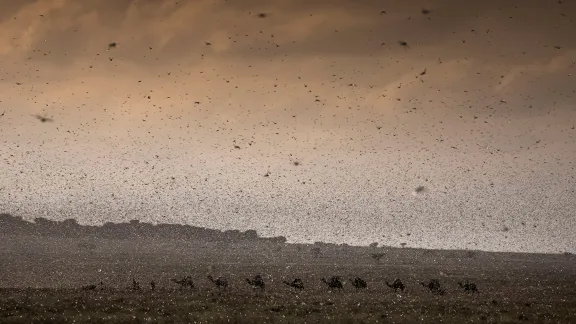
A herd of camels is trying to find its way through an invasion of locust in Ethiopia, Jijiga, December 2019. Photo: FAO/Petterik Wiggers
"Alarming situation” in East Africa
(LWI) - The Lutheran World Federation (LWF) together with other partners working in the East and Horn of Africa region is calling for anticipatory measures to fortify communities against the next locust plague.
In a statement by the Regional Desert Locust Alliance (RDLA), a consortium of 42 organizations working in East Africa, aid organizations call upon donors and local governments to provide additional support to affected communities. They request livelihoods support, pesticides and cash assistance, and to set up early warning systems to detect the next swarm of locusts which is expected to arrive in November or December this year.
“Anticipatory action will both reduce the impact of the crisis while also strengthening the resilience of extremely vulnerable populations”, the organizations say in their statement.
Multiple disasters
The countries in the East and Horn of Africa experienced a locust plague during spring and summer 2020. The locust attacks, which began in 2019, have not only affected East Africa, but also the Arabian Peninsula and the Indian subcontinent. It is said to be the worst recorded in Ethiopia, Somalia and Kenya for decades, threatening food security and livelihoods of millions who are already malnourished or food insecure.
"The situation in Ethiopia and Somalia is alarming” says Sophia Gebreyes, LWF country representative in Ethiopia. The east of the country is among the most affected areas. “This swarm will cause damage to crops and pasture for the next two years.”
As of October, the swarm and bands of immature locusts (“hoppers”) had destroyed hundreds of hectares of crops and greens. 15,000 people have been displaced in the Oromia region. According to the UN Food and Agriculture Organization, close to seven million Ethiopians will be food insecure in December, and up to 11 million in the first half of 2021. The pests add to other disasters, like droughts, floods and the COVID-109 pandemic, which has hindered the delivery of relief goods and necessary equipment to battle the insects in the past months.
Cash support and early detection
LWF has provided seeds, livestock feed and cash support to about 15,000 people in East Ethiopia. The project is supported by the support of the European Union and the Evangelical Lutheran Church in Wurttemberg, an LWF member church.
The organizations forming the Regional Desert Locust Alliance call for support to farmers, through cash or in-kind donation, veterinary care, supplementary food for livestock, cash assistance to support families, awareness raising to strengthen early detection as well as community information.
Early and coordinated support will reduce the negative impacts on food security and livelihoods of already-vulnerable communities.
“We cannot prevent the next swarm from coming, the locusts are already breeding,” says Lokiru Yohana, Regional Program Coordinator for East Africa. “However, early and coordinated support will reduce the negative impacts on food security and livelihoods of already-vulnerable communities.”
LWF/C.Kästner
LWF’s relief work for communities affected by the desert locust infestation is supported by European Union Civil Aid and Protection (ECHO) through the International rescue Committee, and the Evangelical Lutheran Church in Wurttemberg.


